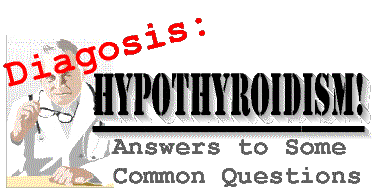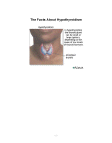








 
|
Great Sources

About
Thyroid Disease

Mary Shomon,
your Guide to
Thyroid Disease
Articles
(The articles provided below are from
the About Thyroid Disease Newsletter. Click to
subscribe)
Many Miss Symptoms of Thyroid Disease
Synthroid
Information Center
Does Coconut Oil Rev Up Your Metabolism
15 Ways to Feel and Live Well With Hypothyroidism
How to Get Your Dr. To Prescribe Armour
When Symptoms Worsen After Thyroid Treatment Begins
Fluoride: Hidden Danger in Drinking Water & Toothpaste
Hypothyroidism & Iron Levels: Anemia & Hemachromatosis
Weight Gain Follows Hyperthyroidism Treatment
Can Thyroid & Autoimmune Patients Donate Blood?
Livesaving Info on Calcium & Thyroid Hormone Drugs
Help! I'm in Diagnosis Limbo!!! -- The Message Board is
another great source for information
Thyroid Weight Loss Center
Twelve Ways to Revive and Boost Your Metabolism
Thyroid Diet Secrets: Eating Enough Calories to Lose?
Do
Thyroid Patients Need a Flu Shot?
15 Reasons Why Your TSH May Be Fluctuating
Fatigue and Exhaustion Solutions
10 Things Your Dr Won't Tell You About Your Thyroid
Chia: Ancient Food and Fatigue Fighter?
Chronic Fatigue Syndrome & Fibromyalgia
Do You Have an Autoimmune Disease?
Thyroid Disease and Breast Cancer: Is There a Connection?
What Thyroid Patients Need to Know About Depression
Autoimmune Thyroiditis Linked to Bipolar Disorder
Get
Iron to Beat Fatigue
What
Hypothyroid Patients Should Know About Synthroid
Could Your Thyroid Be Slowing You Down?
David Derry, M.D., Ph.D. and TSH Testing
Best Hospitals for Hormonal Disorders?
Do I Have a Thyroid Problem?
My TSH Is "Normal" But I Think I'm Hypothyroid
|
|
|
|
Health & Fitness

Hypothyroidism
Mysterious Gland

When the thyroid malfunctions, it can cause a
series of health problems.
(ABCNEWS.com)
It makes its nearly 15 million sufferers feel tired and nervous,
irritable, and sleepless, and it can make them lose weight or
gain weight.
_____________
During the course of my life, this little
gland has been the source of many problems. Sleep apnea,
dry skin, losing and/or gaining weight, from sleeplessness to
sleeping too much, my thyroid gland has served as the irregular
regulator of my life.
As more attention is focused on the thyroid
gland, many women -- if they are fortunate to have a good doctor
-- are no longer considered crazy or hypochondriacs when they
complain of feeling tired. If you do not have the good
fortune of a good doctor, armed with information from Mary
Shomon's site on Thyroid disease or the above-mentioned article
from ABC News, women can now demand TSH tests to determine if
their thyroid levels are too high, too low, or as I am,
borderline for hypothyroidism.
Get
your results after taking the tests. Know your levels!

Thyroid Test Values Chart-- Chart that helps you
interpret TSH levels and other lab values and whether they point
to hypothyroidism.
Back to top
Thyroid Disease 101:
Basic Information on Hypothyroidism, Hyperthyroidism,
Nodules, Goiter, and Thyroid Cancer -- Part 1
by Mary Shomon
Part 1
Where is the Thyroid and What
Does it Do?
Causes of Thyroid Disease
Part 2
Hypothyroidism
Part 3
Hyperthyroidism
Goiter and Thyroid Nodules
Thyroid Cancer
Part 4:
When Symptoms Don't Go Away
Can You Prevent Thyroid Disease?
Part 5:
Resources / More Information
More than 10 million Americans have been
diagnosed with thyroid disease, and another 13 million
people are estimated to have undiagnosed thyroid
problems in the U.S. alone. Frequently misunderstood,
and far too often overlooked and misdiagnosed, thyroid
disease can affect almost every aspect of health, so
understanding more about the thyroid, and the symptoms
that occur when something goes wrong with this small
gland, can help you protect or regain good health
health.
A February, 2000
research study found that the estimated number of
people with undiagnosed thyroid disease may be 10
percent -- a level that is double what was
previously thought. This may mean as many as 13 million
Americans are currently undiagnosed. For women, the risk
is even higher. A woman faces as high as a one in five
chance of developing thyroid problems during her
lifetime. That risk increases with age and for those
with a family history of thyroid problems.
Where is the Thyroid and What Does it Do?
Your thyroid is a small bowtie or butterfly-shaped
gland, located in your neck, wrapped around the
windpipe, and is located below the Adam's Apple area.
The thyroid produces several hormones, of which two are
key: triiodothyronine (T3) and thyroxine (T4).
The thyroid has cells that are the only cells in the
body's capable of absorbing iodine. The thyroid takes in
the iodine, obtained through food, iodized salt, or
supplements, and combines that iodine with the amino
acid tyrosine. The thyroid then converts the
iodine/tyrosine combination into the hormones T3 and T4.
The "3" and the "4" refer to the number of iodine
molecules in each thyroid hormone molecule.

Back to top
When it's in good
condition, of all the hormone produced by your thyroid,
80% will be T4 and 20% T3. T3 is considered the
biologically more active hormone -- the one that
actually functions at the cellular level -- and is also
considered several times stronger than T4.
Once released by the thyroid, the T3 and T4 travel
through the bloodstream. The purpose is to help cells
convert oxygen and calories into energy.
As mentioned, the thyroid produces some T3. But the rest
of the T3 needed by the body is actually formed from the
mostly inactive T4 by a process sometimes referred to as
"T4 to T3 conversion." This conversion of T4 to T3 can
take place in some organs other than the thyroid,
including the hypothalamus, a part of your brain.
The thyroid is part of a huge feedback process. The
hypothalamus in the brain releases something called
Thyrotropin-releasing Hormone (TRH). The release of TRH
tells the pituitary gland to release something called
Thyroid Stimulating Hormone (TSH). This TSH, circulating
in your bloodstream, is what tells the thyroid to make
thyroid hormones and release them into your bloodstream.
Back to top
Causes of Thyroid Disease
What causes
thyroid problems? Besides the treatments mentioned
above, there are other factors that can contribute to
the development of various thyroid problems:
 |
Exposure to radiation,
such as occurred after the Chernobyl nuclear plant
accident
|
 |
Overconsumption of isoflavone-intensive
soy products, such as soy protein, soy capsules, soy
powders
|
 |
Some drugs, such as lithium and the
heart drug cordarone, can cause hypothyroidism.
|
 |
An overconsumption or shortage of
iodine in the diet can also trigger some thyroid
problems. (This also applies to iodine-containing
supplements, such as kelp and bladderwrack.)
|
 |
Radiation treatment
to my head, neck or chest. Radiation treatment for
tonsils, adenoids, lymph nodes, thymus gland problems,
or acne
|
 |
"Nasal Radium Therapy,"
which took place during the 1940s through 1960s, as a
treatment for tonsillitis, colds and other ailments,
or as a military submariner and/or pilot who had
trouble with drastic changes in pressure
|
 |
Overconsumption of uncooked "goitrogenic"
foods, such as brussels
sprouts, broccoli, rutabaga, turnips, kohlrabi,
radishes, cauliflower, African cassava, millet,
babassu (a palm-tree coconut fruit popular in Brazil
and Africa), cabbage and kale
|
You have a higher risk of developing thyroid
disease if:
…You have a family member with a thyroid problem
…You have another pituitary or endocrine disease
…You or a family member have another autoimmune
disease
…You've been diagnosed with Chronic Fatigue Syndrome
…You've been diagnosed with Fibromyalgia
…You're female
…You're over 60
…You've just had a baby
…You're near menopause or menopausal
…You're a smoker
…You've been exposed to radiation
…You've been treated with lithium
…You eat too much soy foods
…You've been exposed to certain chemicals (i.e.,
perchlorate, fluoride)
|
Back to top
|

Hypothyroidism
Most people with thyroid disease end up
hypothyroid, the situation where the thyroid is
either underactive, totally unable to function,
or has been surgically removed. The most common
cause of hypothyroidism is an autoimmune
condition known as Hashimoto's Thyroiditis, in
which antibodies begin to attack the thyroid and
gradually make it inactive. Treatment for
hyperthyroidism also usually results in
hypothyroidism. Radioactive Iodine (RAI)
treatment, and surgical removal of the thyroid
to treat an overactive thyroid usually ends up
leaving a patient hypothyroid. Some people need
to have the thyroid partially or fully removed
-- known as thyroidectomy -- due to
nodules/lumps in the thyroid. This can leave you
hypothyroid. And the treatment for thyroid
cancer is usually surgical removal of the
thyroid. Bottom line: your thyroid doesn't
produce enough thyroid hormone, or you don't
have a thyroid at all -- and you are considered
hypothyroid.
The symptoms of hypothyroidism depend on how
hypothyroid you are, your age, your general
level of health, and how hypothyroidism affects
you uniquely. You may have some or all of the
following symptoms, in varying severity:
You feel tired, exhausted, and
like you can't get enough sleep, or want to take
daytime naps
You feel depressed, down, or sad
You feel cold when others do
not, particularly in hands and feet
You've gained weight
inappropriately, or you are finding it difficult
to lose weight, despite proper diet and exercise
You're losing hair, particularly
from the outer part of your eyebrow, or your
hair is getting dry, or tangly
Your nails are breaking and
splitting and become brittle
You have muscle and joint pains
and aches, or you've been diagnosed with
fibromyalgia
You've been diagnosed as having
chronic fatigue syndrome
You have carpal tunnel syndrome
or tendonitis in arms and legs
You have swelling and
puffiness in the eyes, face, arms or legs
You have a low low sex drive
You have heart palpitations or a
diagnosis of mitral valve prolapse
You're suffering from unexplained
infertility, or have had recurrent miscarriages
with no obvious explanation
You have had a heart attack or
have clogged arteries
You have high cholesterol levels,
particularly the type that is unresponsive to
diet and medication
You have a heavier than
normal menstrual period, or your period is
longer than it used to be, or comes more
frequently
You're going through menopause,
and are having troublesome symptoms
You have worsening allergies,
itching, prickly hot skin, rashes, hives,
urticaria, chronic yeast infections, oral fungus
or thrush, or stomach and abdominal bloating
You have anemia, or an excess of
iron known as hemachromatosis
You find it difficult to
concentrate, your memory is not as good as it
should be, you feel like your thinking is "slow"
You are constipated,
sometimes severely so
You have a feeling of
fullness, or an obvious swelling in your neck
area
|
THYROID HOW-TO!
How to Do a Thyroid
Self-Check
|
For many of you, if you have not had surgery or
radiation treatment that is an obvious cause of
your hypothyroidism, the doctor may dismiss your
symptoms, suggesting instead that you are
suffering from depression, not enough sleep, a
need for exercise, or simply the effects of
stress. For women, you might be told these are
the symptoms of premenstrual syndrome or
menopause or normal post-partum problems.
Back to top
|
THYROID HOW-TO!
How to Tell If You Are Hypothyroid
|
The reality is that symptoms such as fatigue,
anxiety, unexplained weight gain, hair loss, and
depression, may indicate that you have
undiagnosed hypothyroidism.
How do you know if you have hypothyroidism, the
most commonly diagnosed thyroid problem? Start
with a careful review of the above symptoms, and
to help, you can download and print out our
comprehensive
Hypothyroidism Symptoms Checklist.
If your doctor suspects hypothyroidism, he or
she will order a TSH (thyroid stimulating
hormone) test. Most American laboratories have a
normal range from around .5 to 5.5. A TSH level
above 5.5 or 6 is usually diagnosed as
hypothyroid. An
excellent chart showing normal TSH and thyroid
lab values is featured here at the site.
|
THYROID HOW-TO!
How To Interpret Your TSH Blood Test Results
|
However, there are doctors who believe that you
do not need to have an elevated TSH level in
order to actually be diagnosed and treated for
hypothyroidism. Increasingly, innovative doctors
are also viewing high-normal or normal TSH
levels as possible evidence of low-level
hypothyroidism. Dr. John Dommisse, in an
interview with Mary Shomon, has said that
that "The so-called 'normal range' is way too
high"
Elizabeth Lee Vliet, M.D., who runs the
HER Place hormonal medicine centers in
Dallas/Fort Worth and Tucson, and is author of
Screaming to Be Heard: Hormonal Connections
Women Suspect...and Doctors Ignore, does not
tell her patients their thyroids are normal
based only on TSH results. According to Vliet,
"The normal range is relative. Many women have
symptoms -- or are hypothyroid -- when TSH is
anywhere but the lower end of the range."
This broader interpretation of what constitutes
'normal' in terms of the thyroid is discussed in
greater depth in
HELP! My TSH Is "Normal" But I Think I'm
Hypothyroid.
Dr. Vliet also tests for elevated thyroid
antibodies, and low Free T3 and Free T4
levels. "Most women with elevated antibodies are
in the process of developing autoimmune thyroid
disease," says Vliet. "And even with normal TSH
levels, I've found that majority of women with
elevated antibodies, low Free T3 and low Free T4
require thyroid hormone replacement to feel
well."
Doctors usually prescribe the synthetic T4
hormone levothyroxine to treat hypothyroidism.
Popular brands include
Levoxyl and Synthroid Research reported in
the New England Journal of Medicine in
February of 1999 found that a majority of
patients may feel better on a combination of
hormones. On that basis of
that study, more doctors are also adding
synthetic T3 (liothyronine). Alternative
physicians tend to prefer
Thyrolar, Armour, or Naturethroid, drugs
that include both hormones.
For more information, see the Thyroid Drugs
Database:
|
THYROID DRUG DATABASE
|
Generic Thyroid
Drug Names
Levothyroxine /L-thyroxine |
Liothyronine |
Liotrix |
Methimazole |
Propylthiouracil / PTU |
Natural Thyroid |
Thyrotropin alfa
|
Thyroid Drug
Manufacturers
Forest Pharmaceuticals |
Genzyme |
Jones Pharma |
Knoll Pharmaceuticals |
Western Research Laboratories
|
Thyroid Drugs Brand
Names
Armour Thyroid |
Cytomel |
Levothroid |
Levoxyl |
Naturethroid |
Synthroid |
Tapazole |
Thyrogen |
Thyrolar |
Unithroid |
Westhroid
|
Frequently Asked
Questions
With Food or Empty Stomach? |
High Fiber Diet? |
Iodine & Kelp? |
"Goitrogenic" Foods Like Brussels Sprouts?
|
Antacids? |
Calcium / Calcium-Fortified Juice? |
Cold Medicines? |
Vitamins with Iron? |
Estrogen? |
| Breastfeeding & Thyroid/Antithyroid
Drugs? |
| 10 Ways to Remember Your Pills? |
| How To Take Thyroid Medication
|
Back to top
|
|
|
|
|
|


Fact Sheet on Hypothyroidism
Will I Ever Be
Thin Again?
"Perhaps the worst thing to for
me to accept is having gained 15 pound in the last three months and
still gaining! I am worried that I may never get back to my previous
weight. I have never had a weight problem in my life until now. I am
48 and am sick of everyone telling me it is also because of my age. I
wasl 48 and slim before my thyroid decided to take a permanent
vacation. Once you are stable on meds does weight fall away?"
Check Out
Symptoms
According to statistics from the Thyroid Foundation of America, nearly
9.6 million Americans with a thyroid disorder are unaware that they
are ill. That's nearly half the number of Americans who suffer from
it. This is partly because many of the signs and symptoms of thyroid
dysfunction are non-specific.
Some of those
symptoms include fatigue, changes in weight, low mood and
forgetfulness. If you are experiencing any of the symptoms, check with
a doctor. Doctors can provide a definitive diagnosis with a simple
blood test to measure the levels of the thyroid hormones TSH, T-4 and
T3.
For more information on thyroid disease go to
The Thyroid
Foundation of America Web site.
|

|